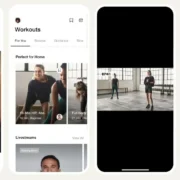Consumers may cut back on extras as a cost-savings move, but fitness memberships have become an “essential luxury” for many as Orangetheory and Life Time lead the high-end fitness space
Luxury country club operator Life Time and premium boutique fitness franchise Orangetheory are demonstrating strong performance in the high-end fitness sector, despite a growing interest in budget-friendly gyms.
The findings were illustrated in a new report from Placer.ai, a software company leveraging location intelligence and foot traffic insights.
Overall, the report highlights that the fitness industry continues to thrive and although many consumers are reducing discretionary spending, a significant amount view gym memberships as an “essential indulgence.”
Here are some highlights from Placer.ai’s report.
Investing in the Member Experience Pays Off for Life Time
Headed by CEO Bahram Akradi, Life Time has a loyal and highly engaged member base, with 86% of its Q2 2024 visits stemming from frequent visitors (such as those who visit the gym at least four times a month). By comparison, value gyms saw 78.3% of similar visits.
The luxury country club operator has steadily invested in creating a rich experience for its members, from pickleball to personal training, and raised its revenue guidance in August.
In the second quarter of the year, Life Time saw foot traffic increase by 5.4%, while Orangetheory saw a 7.8% boost compared to 2023.
Orangetheory is Advancing Tech for Personalized Experience
For its part, Orangetheory experienced a higher share of casual visits, which Placer.ai attributes to the boutique fitness franchisor’s class pack offering that can be used over a longer period of time. The heart rate-based interval training fitness giant merged with Self Esteem Brands, the parent company of Anytime Fitness, in a major deal earlier this year.
Unsurprisingly, Life Time and Orangetheory were more likely than budget-friendly gyms to attract those earning $150K+ in Q2. At the same time, value gyms were more apt to draw in fitness enthusiasts with household incomes below $100K. Still, those earning between $100K and $150K are almost as likely to visit a value-focused gym operator, according to Placer.ai’s findings — which is welcome news to high-value, low-price (HVLP) operators.
Known for its tech-forward approach and integration of wearables, Orangetheory is focusing on providing an ultra-personalized member experience. The boutique fitness franchisor’s co-founder and CEO Dave Long told Athletech News that Orangetheory is working towards enhancing its proprietary technology to offer more prescriptive fitness experiences.
“In our Orange 60 classes, for example, we’ve fine-tuned technology’s role in our heart rate-based interval training, fueling each member’s performance in the studio,” Long told ATN, adding that the brand is also eyeing connected strength equipment and personalized training recommendations through Orangetheory’s mobile app.
The Future of Fitness Looks Bright
While Orangetheory and Life Time enjoy solid footing, all told, it appears there’s enough fitness pie for everyone. HVLP giants like Crunch Fitness and Planet Fitness continue to entice Gen Z fitness consumers with value pricing and a slew of amenities. Meanwhile, emerging brands such as Chuze Fitness and Retro Fitness have begun charting their expansion plans for the coming years.
One outlier in the booming HVLP space is Equinox-owned Blink Fitness. After voluntarily filing for bankruptcy late this summer, Blink quickly found a stalking horse in U.K.’s PureGym. Considered one of Europe’s top fitness operators, PureGym’s subsidiary Pinnacle US Holdings made a move to acquire the affordable gym brand’s corporate operations and a substantial portion of its locations, primarily in New York and New Jersey. The deal is subject to court approval.












